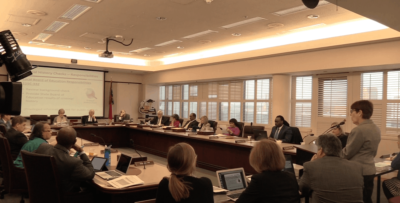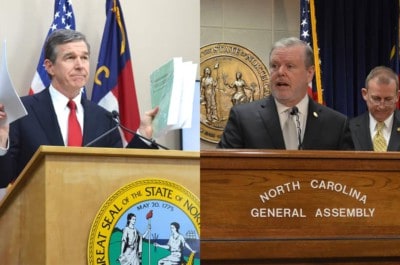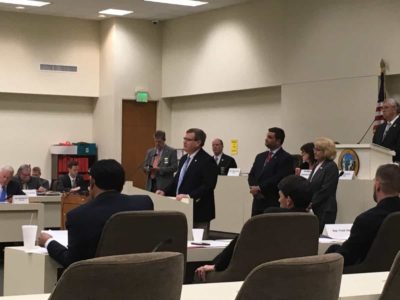Hurricanes wreak havoc but they also spark political fires. What flames will lawmakers rush to extinguish in the aftermath of Hurricane Florence?
A first indication comes in comments from both State Superintendent Mark Johnson as well as House Speaker Tim Moore, R-Cleveland. Both have talked about the need to allow school districts to be forgiven for the instructional days missed due to the hurricane.
This is what Moore said in a press release:
“I think we need to look at a waiver for attendance days, we don’t need to have kids who may be missing schools for weeks at a time, trying to make that up for weeks into the summer. I think that’s unreasonable. I think we need to make some accommodation on that, on the school calendar,” he said. “That’s something I support and believe we can take care of. So many families’ lives are being uprooted right now and anything we can do to make their lives easier, we need to do.”
This brings us to the topic of calendar flexibility. The reason Moore and Johnson are talking about forgiving missed days is because the state mandates that students are in school for a certain number of days each year: a minimum of 185 days or 1,025 hours of instruction. No problem.
But, there is a problem when it comes to how schools make up for missed days. You see, the state also mandates the start and stop times for school each year. If a school is not year-round, it can’t start earlier than the Monday closest to August 26, and it can’t end later than the Friday closest to June 11.
This creates a problem because the state isn’t uniform. In the west, schools may unexpectedly miss a certain number of days each year due to snow. In the east, inclement weather — like hurricanes — forces students to miss school as well. But none of this is predictable. So, schools are often forced to jam in make-up days at odd times, like weekends, in order to get all the requisite school time in before the mandatory stop date of the year. Districts argue that if they had calendar flexibility — the ability to start and stop school when they think it should be stopped — then they could build make-up days into the school year to ensure that extreme measures don’t have to be taken to get kids the instruction that is mandated.
This is just one argument districts make for calendar flexibility, but it is the one that is apropos right now.
One of the likely reasons why Johnson and Moore are suggesting forgiving the missed days from the hurricane is because the amount of time missed is enough that it may be extremely difficult or even impossible for districts to make up the time within the mandated start and stop dates of the school year.
Back in 2015, a huge number of bills were filed to grant calendar flexibility to different school districts and even statewide. They went nowhere. And these kinds of bills have continued to go mostly nowhere year after year.
The question is will this hurricane spark reform? After Hurricane Matthew in 2016, some districts were similarly forgiven for the days they missed, and yet calendar flexibility still remained basically off the table in the North Carolina General Assembly. There is no reason to think that this time things will be different. But the call for flexibility has been increasing.
There is a bipartisan coalition of organizations that have been advocating for calendar flexibility for years. Restart schools — which are given charter-like flexibility but continue to be run by the school district — have been embracing calendar flexibility as one of the privileges granted under the school reform model. In the 2017 long session, two pieces of calendar-related legislation cleared the House but went on to languish in the Senate. And in the 2018 short session, the General Assembly dubbed Rowan-Salisbury Schools a renewal school district, which grants all schools in the district charter-like flexibility, including calendar flexibility. But despite these incremental steps, the quest for calendar flexibility for all North Carolina schools remains unrequited.
Thousands of NC students still unable 2return 2school. For many, won't b til October. Longterm solution 2 ensure they don't keep losing lose out on valuable #NCEd is for #NCGA to allow local officials 2 have more say setting local school calendars. #FlorenceNC #1SizeDoesntFitAll pic.twitter.com/Myj565jUha
— Local Authority for NC School Calendars (@nclocalcalendar) September 21, 2018
If you’re wondering why legislators have such a hard time championing the topic, it’s because of the tourism industry. The industry relies on summer vacation season for the success of its businesses. Industry leaders worry that calendar flexibility could change the make up of that season and eat into their profits. Seeing as summer business is an integral part of the state’s economy, it’s understandable that legislators would be reluctant to do anything that might impact it negatively.
But we return again to Hurricane Florence. The storm was just the latest instance of a phenomenon that strikes North Carolina again and again. Sure, there will be times when a disaster is so bad that no amount of calendar flexibility will fix the problem. But for every catastrophic hurricane, there are smaller storms that impact students in particular districts and cause them to miss school. Forgiveness is a rare occurrence. But the need to make up unexpected missed days is perennial.
Will policy ever change to make it easier on districts? Or will the burden remain on district leaders to figure out a way to rectify two state mandates: the number of days students must learn and the dates within which they are allowed to be taught? Where do you stand on this issue?
Recommended reading




